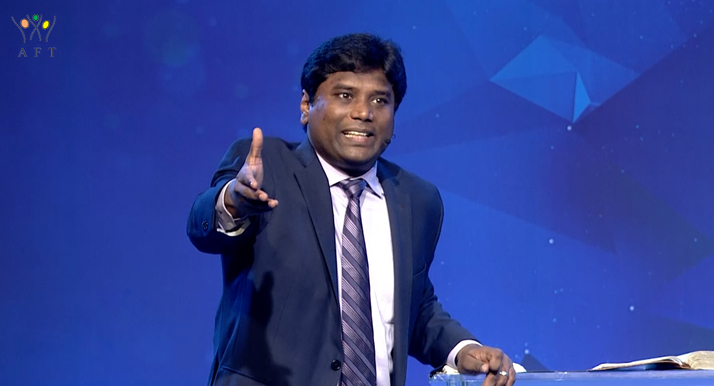
The Christian Way of approaching Adversity (Part-02)
Sunday English Service – 07 MAR 21
Transcript
What is the Christian way of dealing with adversity, suffering, challenges, problems? Is there a Christian way of responding to that? And what is that? That’s what we’ve been talking about; well, we just began it last week. In the world that we are living today, it has become clear, that we are going to face various kinds of adversities, various kinds of challenges and problems, difficulties, and even perhaps sometimes, suffering. It’s inevitable. You can’t escape it. Even those who were under some kind of delusion previously, now, have come to their senses that, you can’t escape it. We are not living in heaven; we are living on earth, where these things are inevitable. You’ve got to face, at some point or time, you’ve got to face these problems, adversities, difficulties, sufferings, even perhaps sometimes. So, there’s no escaping it; we will face it. You know, we can divide all people into three groups: one group, is about to face a problem; one group, is right in the middle of a problem; and another group, is coming out of a problem. All of us, will fit into one of those three categories – either, we’re about to face a new problem, or we’re right in the middle of a problem, or we are trying to come out or we’re on the way, out of a problem. It’s inevitable and we face it and we end up responding to it; that also is inevitable. We end up giving some kind of response, reacting in some way to these problems, to these challenges, in life. We end up dealing with them in some way. The question is, how? What is that way? Are we going to respond with the Christian way? Are we going to respond with the worldly way? Are we going to respond however we feel like responding, the natural response that comes? Or are we going to respond with the Christian way?
There is a Christian way of responding to adversity and suffering. The New Testament teaches it very clearly, again, and again, in various places. This is what we began to see, last week, from an important passage – James, chapter 1. Let’s go there again: James, chapter 1, in verse 2 to 4, is what we saw last week. I want to read it again and remind you quickly of what we saw, and then move on; build from there. James, chapter 1, verse 2, to 4: Count it all joy, my brothers, when you meet trials of various kinds, for you know that the testing of your faith produces steadfastness. And let steadfastness have its full effect, that you may be perfect and complete, lacking in nothing. What did we see last week? We saw that James is teaching us the Christian way of how to respond, how to react, how to approach trials, problems, difficulties, adversity, whatever you want to call it. How should we react? How should we respond? What is the Christian way? We should “count it all joy”, when we face all kinds of trials, when we fall into – as some translation says, various trials – when those trials come on our path, we should respond, how? We should “count it all joy”; we should count it pure joy. Now, that sounds ridiculous to hear, if you’re hearing it for the first time. But then if you look closely, like we did last week, you will see that James gives us the reason why we can count it all joy.
When we know that it will end good for us, when we know that it will lead to a good ending for us, we can count it all joy. Remember that good ending? How James tells us to look at the problem. Don’t just look at the problem, as a problem, but rather as a test. He says, “Knowing that the testing of your faith” – this is a test and you’re going to pass this test. And not only that, it’s going to produce something new inside of you, which was never dead before: patience or steadfastness or endurance. When you know that this test, not just a problem, but a test, will end up producing something new; an amazing quality on the inside of you, endurance, steadfastness and not only that. If you allow the process to continue, if you respect the process, if you honor the process, and don’t just get bitter and angry and react in the wrong way but rather allow God to use it, for your good, if you let it happen the way it’s meant to happen, the way God wants it to happen, it will actually end up producing something even bigger than steadfastness. Let patience have its perfect work that you may be perfect and complete, lacking in nothing. Not only patience, but other qualities.
I told you last week, it’s talking about the inward development of character; our nature or character, coming to its full development and maturity, lacking in nothing, perfect and complete – full spiritual maturity – that’s what it’s talking about. James is saying, “Count it all joy, knowing that this terrible-looking thing is actually going to be the atmosphere in which God is going to make something good come out of this. Something good is going to get produced inside of you. This is going to that good ending; know that, realize that and count it all joy”. We explained this in detail last week. And I think you would have understood it, to a certain extent. What next?
Well, it’s one thing to explain it; it’s one thing for you to understand it and say, “Okay, yeah, I can see. Okay, yeah, how James is thinking, and this is the logic and this is how we can count it joy”. It’s one thing to say that, but it’s yet another thing to actually accept this truth, deep down in your heart. Bible truth, is not just to be understood, but actually accepted. Your heart should nod and say yeah, and then, you actually should put it into practice in life. It’s one thing to hear it, understand and say, “I got it, I think I understand it”. But it’s another thing for you to accept it, deep down in your heart, be convinced of it, and then put it into practice in your life. That is very difficult, my friend, actually, that’s real difficult. If you think about it, especially for people, who are in the middle of problems, it’s very difficult for them to count it all joy. I mean, people, in the middle of a problem, when they hear statements like this, they may respond like this: “What do you mean, ‘count it all joy’? Do you know what I’m going through? Do you know my pain, my suffering, my heartache? Do you even have any idea, what I’m in the middle of? How can you say, ‘count it all joy’? What do you mean, ‘this is going to end well and produce’ this and that, and the other, you know? You wouldn’t be talking like this, if you knew what I’m going through.” That’s the kind of natural response that comes from us. Because we go through pain and things like that, right?
If you’re in the middle of a trial, even if this makes sense to you, even if you understand it, even if you get it, and then, even if you want to accept it, actually, putting into practice, is still difficult because there are several practical hindrances, practical obstacles. If you tried to take this truth, this Christian way – James gives us the Christian way, very clearly, in verse to 2 to 4. He says, “Here is the Christian way. This is the Christian way; follow it, count it all joy, knowing this truth, knowing it’s going to end good for you”, right? But to take that and put into practice, even if I want to put it into practice, there are several things that come in the way, try to hinder us, stop us, several obstacles, practical difficulties; it’s not easy to put it into practice. James knows this. He’s a very practical teacher. James, the Book of James, is probably the most practical book in the New Testament. If you read it, you know, it begins like this. But if you keep reading, it gets more and more practical. It’s about practical living, really. And he’s a very practical teacher; he thinks very practically; he is sometimes harsh, but he thinks very practically. And so, in verse 2 to 4, he has clearly taught the Christian way. But then he realizes, it’s got to be really difficult for the people – at least some people – to one, accept it, be convinced of it and really accept in the bottom of their heart and actually, put it into practice. That’s another story. He recognizes the defeat, the practical difficulties associated with that. And therefore, what does he do?
In the next verse, he addresses that in verse 5, after giving us the Christian way. Look at verse 5: If any of you lacks wisdom… Everybody say, “wisdom”. Why does he talk about wisdom next? Immediately, after giving us the Christian way, here’s the Christian way. Why does he talk about wisdom? Because the subject of wisdom is so wide, so deep, it’s so broad in scope, that within that one subject of wisdom, he is trying to address almost all of the practical difficulties and obstacles that try to hinder us from actually putting into practice the Christian way.
Wisdom is a very rich word in the Bible, right? It’s very, very deep in meaning; it’s very broad; its scope is huge. It covers everything. Almost every practical hindrance and obstacle that keeps you, prevents you, from actually taking this teaching, in verse 2 to 4, counting it all joy. And actually experiencing, putting into practice, anything that prevents you, is covered under wisdom; almost anything. That’s the beauty of this word, “wisdom”. What James is doing is basically… He’s a wonderful practical teacher, and he recognizes people are going to have all kinds of practical difficulties, trying to put this into practice. And so, with all that in mind, he finds a simple way to talk about it. He reduces all the many different complications and complexities and different practical difficulties into one simple word, “wisdom”. Everybody say, “wisdom”. That’s it. He makes it simple for us; it says, “wisdom”, but there’s so much in that. He’s thinking of many possibilities, many, you know, varied complications. He makes, what is very complex, very simple. As they say, you know, simplicity on the other side of complexity, to me is very complex. But James finds a way to present it very simple and he says, “Here’s the problem: we lack wisdom”. Why, we are not able to take the Christian way and actually, put it into practice is, we lack wisdom. And when he says that, he’s thinking of so many different things, that are wrong.
So, what we’re going to try to do today is, we’re going to try to understand this problem. And then we’re going to look at the solution. What is the problem? The problem, in one sense is, many practical difficulties. Trying to put this into practice, there’s so many things that stand in our way, right? But from James, if you look at it, from a simple point of view, there’s only one difficulty: we lack wisdom. Those who like wisdom, are the ones who will find it difficult to actually put this into practice. Put what into practice? The Christian way, taught in verse 2 to 4. Those who like wisdom, are the ones, who will find it difficult to, “count it all joy”. That’s the problem. So, we’ll look at the problem first and then, we’ll look at the solution. We need wisdom; how do we get wisdom? We’ll look at that. All right.
So before beginning, let me just quickly also say, that wisdom is a very vast topic, and we’re not going to try to say everything, or many things even. We’re going to try to relate wisdom, specifically to what we saw last week, because James relates it. He speaks about it, one after the other. Okay. So, we’re going to look at wisdom – not wisdom in general – but wisdom, in the midst of trials; wisdom, in the midst of suffering; wisdom, in the midst of problems. Alright, so let’s begin by trying to understand how wisdom is the thing that we lack. That’s really that’s the problem with us. Wisdom is what we lack and that’s why, it’s very difficult sometimes, to accept this Christian way and to actually put it into practice. James, as far as James is concerned, if you ask him, what’s the number one thing? What’s the one thing that hinders Christians, after reading verse 2 to 4? What’s the one thing that hinders Christians, from actually taking it and putting it into practice? He will reply, “wisdom”. That’s why, he put it in verse 5. Right?
When you read the Bible, you’ve got to think about why one verse comes after the other, right? You’ve got to take the verses in its context; you’ve got to read it as a whole, right? We can’t just adopt the promise calendar method of just taking versus isolated, pulled from here and there and everywhere and separately, consider them only. No, no, that’s not enough, right? People say, just give me a promise, one promise, one verse for this month. No, no, that’s not enough. You go read your Bible, you know. Read the Bible, look at the promise in its context. There’s a reason the Bible was not written in just, you know, one word here, one word, no, no. There are books, episodes. The whole episode is written by James. It has a certain unity; it has a certain cohesiveness. It’s meant to be read, one verse after the other, and you’re meant to connect the themes in it. And when you read 2 to 4, and then verse 5, you’ve got to ask the question: why does he talk about that? Why does he bring wisdom next? What’s the reason? And the reason is very simple. As far as James is concerned, this is the one thing that will keep us from putting this Christian way into practice. This is the one thing and in it are all other things, that are involved. So, let me try to explain, how it’s a lack of wisdom that prevents us from embracing the Christian way taught in verse 2 to 4.
I hope that you want to embrace the Christian way. Last week, I taught the way. What is the way? Count it all joy. Everybody say, “count it all joy”! Do you like the way? That’s the Christian way: count it all joy. I hope you want to follow that way; I hope you want to embrace it, that you really want to take it to heart and do it and put it to practice, right? I want to. I think every person, almost every person, will want to. But what is the thing that prevents us from actually putting it into practice, embracing that, with all our heart, actually experiencing it? What is it? It’s a lack of wisdom. Now, I can show you this in several ways but let me show it to you, in one specific way. All right. It’s a lack of wisdom that prevents us from counting it all joy. What prevents us from counting it all joy? It’s a lack of wisdom.
Now, James says, “Know this and count it all joy”. Know some truth and count it all joy. We taught that last week. People get it; I get it. I’m the one who taught it. And yet, when we try to go and put it into practice, and actually, when the difficulty comes, the trial comes and we try to do what James says, we’re going to have a little bit of trouble counting it all joy. I’m talking about most people. Most people will read this, they’ll understand it, but when they go to put it to practice, they feel like I’m not able to count it all joy. I’m able to count it a little bit joy, maybe. “Count it all joy, pure joy, only joy? Oh, that’s a bit too extreme. This is too much. This is, you know, impractical”, they’ll say, right. Why are we not able to count it all joy, even after we understand, even after we get it? We have to know the truth and then count it joy? Well, I’ll tell you the reason, simply, one reason. There may be several reasons. One important reason is, we are not that happy about the ending. We are not that happy about the ending. What do I mean by that?
You see, James’s entire encouragement, depends on whether or not you are happy with the ending. What do I mean by that? James is basically saying, “Know that this present problem you’re in, will actually have a good ending. Know the ending, think about the ending and count it all joy”, that’s what he’s saying. Think about the ending and count it all joy. It’s not going to always be like this; it’s going to have a good ending. What is the good ending? The inside of you, something good is going to be produced: patience, steadfastness, endurance. Not only that, it will lead to a full development of character, nature; that’s the good ending, right? He gave the ending to us. Now, the problem is, we are not that happy with the ending. Yeah, it sounds good but it’s not. That doesn’t sound that great, to many of us, sometimes. It’s like a movie, you know? These guys who make the movie, they put in so much thought and effort and money and all that. In the end, some people watch the movie and they don’t like the ending. Have you seen that? In our country, they don’t like the ending, they pick up stones and throw. They don’t like it, if according to them, it didn’t end well or whatever, right? When the ending is not good, it kind of spoils their joy, spoils their happiness. Here, what’s happening is, we like the ending – yeah, inside, steadfastness and patience and all these qualities and character grows and develops and then it sounds good. Yeah. But for all that, should I struggle so much? We feel like, okay, the ending is good, but is it good enough? Is it worth going through this path to get to this ending? Let me give you an illustration.
Imagine you’re under lockdown, always, at home and your kids are just so sad. The state of kids, right? They’ve got to stay home; they can’t go out and play, sometimes all this. And so finally, you want to give your kids some relief and you say, “Come let’s go. I want to take you somewhere good. I want to take you to a good place”. And you get them all in the car. You put them in the car and you say, “I’m going to take you to a good place”, and you start off and you drive and you hit some traffic. Right? There’s a lot of traffic, you know, it just starts getting very irritating. Right? The kids are just irritated. They say, “Why did you pull us out? We were watching TV”. “You pulled us out and said we’re going to good place”. And then, you tell them… So far, you haven’t told them where you want to take them. But then now you say, “No, don’t worry; don’t get so irritated and frustrated. I’m going to take you to a real good place. Think about the good place. You know where I’m going to take you? I’m going to take you to the library. Library, that’s what I said. Yeah. I actually tried this on my son. You must have seen his face. It’s just disappointment, written all over it. “Library?” See, he was having some other good place in mind. When I said “good place”, he was thinking, maybe you know, maybe there’s a playground, maybe it’s a mall or maybe it’s an ice cream shop or maybe it’s this or that, you know, that’s a good place. That’s a good place. “Library!” What? For those good places in his mind, he thinks, it’s worth it to endure all this obstacle and traffic and go and reach there. But, library?
What’s happening is, that’s how some Christians react, when they hear James tell them where they’re going. James is saying, “Count it all joy, my brothers, knowing that the testing of your faith produces patience”, and people are listening. Okay, where does this go? And then, “patience will result in you becoming perfect and lacking nothing”. And you realize, he’s talking about inward character, mainly; that’s the emphasis. You come to the ending and you say – you can’t show a disappointing face, like my son did, because now, it’s James, and it’s the Bible. You can’t revolt against the ending. So, you just say, “Yeah, amen, brother”, you know. The ending is good, but it’s not that good, according to some people. The ending is good, but is it good enough, to cross all the obstacles? Is it good enough; is it worth it, to endure so much pain and hardship and all this for that, in the end, for my inward character to be developed and come to perfection? You see, just like the kids, the children have other destinations in mind. They don’t see the value in a library; their parents see the value of the library. Parents understand that libraries are worth the trouble; kids don’t, you see. What’s the difference between the parents and the difference between the parents and the kids; it’s wisdom. They lack wisdom. Kids have many good qualities, but wisdom is not one of them. Parents are grown and as they grow, they develop… Wisdom is seeing the real value of things, it’s esteeming things with real value, seeing the true value of something, and esteeming it to as high as it should be esteemed. Wisdom is able to look at two things and consider, okay, this is valuable; wisdom is able to see that, know that.
Just similar to that illustration – you have the parent and the kid, right? Here you have James, and you have believers. James is like that parent. He is all, you know, excited, right? We’re going to the library; he sees the value of that. James is all excited because he sees the value of inward character. He sees the value of developing inward character and getting to spiritual maturity. He sees the value of a person becoming more and more like Jesus Christ. He sees the value of a person growing on the inside, in steadfastness, in patience, in love, in humility, and all these qualities on the inside. He sees the value of that and he’s so excited about it. He says, “Guys, count it joy, because of this great ending!” And some believers are listening and going, “Great ending? Is it really great?” The reaction difference comes because of a difference in wisdom. James has grown in wisdom; some of the believers, hearing him, have not grown in wisdom. They don’t value the development, and the perfection of inward character, as much as James does.
James places a very high premium on it, a very high value on it, because he has wisdom, divine wisdom, Christian wisdom, wisdom with eyes to see the way God wants you to see. And he sees this as very valuable, as worth all the trouble, you have to cross to get there. The New Testament places a premium, very high premium, on this matter. What matter? The development of inward character. We place a premium – when I say, “we”, I’m just meaning, generally, right? People generally place a premium on… In their mind, what is their goal? They just want to go to a place that, you know, where all their needs are met, where it’s comfortable, or you know, where they’re safe, secure – safety, security – these are the kinds of things that people want. That’s the goal. And that’s fine, that’s good, that’s necessary. But the world also has that goals and what is the difference between them and us? The difference is in addition to those goals, for us, it’s not just safety, security, abundance, blessing, it’s not just those things. In addition to that, there ought to be a premium placed, on the development of inward character. How much value do we place on that? The New Testament places a very high value.
Let me take you to 2 Peter, chapter 1. Let me just show you this. It’s amazing how, different places in the Bible, teach very similar things and here’s an example. The difference is wisdom. Those who lack wisdom, don’t see the value of this. And let’s read 2 Peter, chapter 1, verse 3 onwards. Verse 3 onwards: as His divine power has given to us all things that pertain to life and godliness, through the knowledge of Him who called us by glory and virtue, by which have been given to us exceedingly great and precious promises, that through these you may be partakers of the divine nature, having escaped the corruption that is in the world through lust. It’s an amazing opening here. What he’s saying is, God’s divine powers has given to us all things that pertain to life and godliness, through His knowledge and He called us by glory and He’s given us exceedingly great and precious promises. Why? For what purpose? Then only he mentions the purpose: He’s done all this – called us, given us promises and this and that for this purpose – that through these you may be partakers of the divine nature. Everybody say, “divine nature”. Not just, nature; “divine nature”. What is he talking about? He’s saying, the purpose why God called you, saved you, gave you promises, this and that, the higher purpose for this is, so that you will become a partaker of divine nature. That means you will become, in nature, more and more like God. That’s what it means is. You will actually partake of the divine nature. And then he explains that – keep reading. Always, if you want to know what he means, just keep reading: having escaped the corruption that is in the world through lust. And verse 5: But also, for this very reason, giving all diligence, add to your faith virtue, to virtue knowledge, to knowledge self-control, to self-control perseverance, to perseverance godliness, to godliness brotherly kindness, and to brotherly kindness love. You see what he’s done here? All those qualities, are inward qualities. Did you notice that? He talked about partaking of the divine nature, and then he’s explaining that. He saying, “Add to your faith”. You have faith, but it’s not enough; add to your faith, virtue.
Now, virtue – in this translation says, virtue – I don’t know what others say. But in the Tamil, it comes “Tairiyam” – add to your faith, a kind of fortitude, courage, right? Faith, you have but keep adding to it. Add courage, virtue, add knowledge to that. And then to that, knowledge, add self-control, all of them inward qualities. And then to that, add perseverance – what James talked about. And then to that, add godliness; and then to that add brotherly kindness; and then to that, add love; keep adding. Don’t be where you are. Don’t stay stagnant, keep adding, keep growing. Where? On the inside. These are inward qualities, that speak of a person’s character and nature. He’s saying, inside, you need to become more and more and more like God; keep adding. And then, look at verse 8: For if these things – these inward qualities – are yours. For if these things are yours and abound… Everybody say, “they’re mine”. And they must abound. For if these things are yours and abound, you will neither be barren nor unfruitful in the knowledge of our Lord Jesus Christ. What he’s saying is, for the knowledge of Jesus Christ to be fruitful, you need to have these qualities and you need to abound; keep growing in them. What that means is, what is the use of, knowing Jesus Christ, following Jesus Christ, if you don’t have and grow in these qualities? That’s like a tree, not having fruit. That’s like a barren land. What is the use? Nothing is happening there. It’s not how it’s supposed to be.
Another passage quickly, Colossians, chapter 3. What I’m trying to say is, the New Testament, places a very high premium, value on the development of our inward nature, character. We need to become more and more like Jesus Christ. We need to become more and more, like the divine nature. This is very important to God, you know. And those who have wisdom, will realize that. Colossians 3, verse 12; if you look in Colossians, you’ll see from verse 5, Paul says, “Remove these things from your life” or “Put to death”, he says. Verse 5: put to death, all the filthiness and all this thing and you know; he gives a list there. In verse 8, again, he says, “Put off all these things”. Put off, means, take it off. And then in verse 12, he talks about, “Put on these things”. Everybody say, “put on”. It’s actually, in Tamil as well, I think, the original also has the notion of putting on clothes, like, clothe yourself; clothe yourself. Put on what? Put on all these layers of clothing – what to put on? In verse 12: Therefore, as the elect of God, holy and beloved, put on tender mercies, kindness, humility, meekness, longsuffering; bearing with one another, and forgiving one another, if anyone has a complaint against another; even as Christ forgave you, so you also must do. But above all these things put on love, which is the bond of perfection. You see that? Perfection. If you see, again, this whole list I read, every one of them is inward quality. Did you see that? Look at that, look at the list again: tender mercies. Everybody say, “tender mercies”. Kindness, humility, meekness, longsuffering; bearing with one another, forgiving one another. But above all these things, put on love. Peter also taught the same thing. He says, keep adding, adding, adding. Paul says, keep putting on, putting on, putting on and above all, finally, put on love, which is the bond of perfect. The New Testament idea of perfect; the way it’s meant to be. The ideal goal for the Christian, has to do a lot with, the inside development.
So, James has this wisdom, right? This is not a worldly wisdom. This is a biblical wisdom. This is a New Testament. This is a Christian wisdom. This is a wisdom, where you understand what’s important to God and you give that importance, right? This is a wisdom, where you understand that, even though the world has its own goals, your goals are not just like the world’s goals; your goals, are God’s goals. And for God, it’s very important that you become more and more like this, perfect in character. Only those who are excited about this destination, will count it joy, knowing that this path leads them to that great destination. The one with true wisdom, knows that it’s great. He gets it, he realizes it, he is convinced of it, to the extent that we value the perfecting of our inward character; to that extent alone, will we be able to count it all joy. To the extent that we value this ending, the perfect thing of our inward character; to that extent only, we can count it all joy. There is no mystery to this. That’s it. There are many, many other things. But I’m saying, in a way, it’s simple. Do we value it or not? And if we value it, that shows we have wisdom; if we don’t value it, it shows, we lack in wisdom. If we can’t see it – we all see it, as great – but the question is, do we see it as, worth the trouble? Do we see it as worth it, to go through whatever it takes? That’s the question. If we can’t see it that clearly, if we’re not convinced, if we if we don’t get excited about it, like James does – “Count it all joy, my brothers!” Knowing this is going to such an amazing ending! If you can’t get that excited about it, it shows we lack in wisdom. We are like a child, spiritually. To be wise, is to see the true value of things; to have the right goals, to desire the right things and to get excited about the right things. The problem then is, we lack wisdom.
Now, this is just one point I took and showed you how, the root problem here, is lack of growth, lack of wisdom. But let me mention another one. Just describe it briefly and move on. Another case, where I can show you how, it’s a lack of wisdom, that’s the problem. Because we lack wisdom only, the troubles of life seem meaningless, sometimes unnecessary and such a waste. Have you felt like that? All of us, feel like that, at some point or the other, don’t we? We feel like, is so much trouble, necessary, you know? It’s just a waste. What is the meaning of all this? Why should I go through all this? You know, what a waste. Now, I understand that, out of frustration, we speak like that, we think like that and we are irritated, we’re angry. All that is valid and understandable. But the thing is, that is contrary to, divine wisdom. Because this again, see, God’s wisdom, divine wisdom, says, “Divine wisdom is basically, understanding the ways of God, understanding how God operates, understanding how God sees things, and God never sees anything as a waste. God will never waste your pain. God will make sure, that no hardship you ever go through, no pain you ever endure, is a waste. He will make sure to use everything, for the fulfillment of his greater purposes and greater glory. God will make sure. But again, let me clarify. We’re not saying, God is giving you the pain, or God is giving you the whatever problem. No. We’re saying, the problem comes – there are reasons why problems and hardships and sufferings come. There is other sin. Every sin is a reason, the devil is a reason. We live in this world; there so many reasons. I mean, we don’t have time to get into that. But problems come, there are other reasons. But God doesn’t stand by and watch as they come and just, you know, run out, or run all over you and turn you into nothing and go, where just becomes meaningless and unnecessary and a waste. God will not stand by, watching like that. God will make sure. I’ll say it again, God will make sure, that no problem you ever face, no pain you ever endure, no hardship that you ever go through, becomes a waste. He will take it all, and He will turn it and He will use it. And He will, you know, fulfill His greater purposes; He will bring something good out of it, for His glory and for your good. That’s seeing things, with the eyes of wisdom. But seeing pain and hardship as a waste – while we understand the frustration of people – what shows is, the deeper problem there, is a lack of wisdom; a lack of divine wisdom or an inability to see things from God’s perspective; an inability to trust the power of God, which can operate in the midst of the harshest circumstances. An inability to see life, pain and hardship with God at the center, meaning, God can turn this evil into good.
The cross is a prime example for this, right, the cross? I mean, think about it. Here on the cross, people would have, I’m sure many people would have said, well, what a waste. What is the meaning of this? The most meaningless and unnecessary and wasteful and perverse suffering? Here is a man, who has not done anything wrong – not a single thing – the purest, the holiest, and they beat Him and they put Him on the cross and He died in shame and agony, shed his blood. What is the meaning of this? For people who did not understand the cross, the beginning might have spoken like that. But look at what God does. He takes that – the cross, the greatest – from one standpoint, from one perspective, the greatest evil, done. You know, people talk about, how can evil, bad things happen to good people? Right? That’s a classic question, isn’t it? How can bad things happen to good people? You know what the best answer for that is? The cross. The cross. The worst thing happened to the best – Jesus Christ. But God takes it; makes it the most powerful thing; makes it the thing that brings salvation to all. God’s ways are higher than our ways. God’s ways, we cannot understand, we cannot fathom, until He finishes it. What we have to trust is, He can do it. No pain, no hardship is meaningless, no suffering is meaningless.
Look at the 2 Corinthians, 4:17. 2 Corinthians. There are many passages but I’ll just read this one. 2 Corinthians, chapter 4, verse 16 onwards, we’ll read: Therefore, we do not lose heart. Even though our outward man is perishing, yet the inward man is being renewed day by day. 17: For our light affliction. Now, this is a man with wisdom speaking. This is the Apostle Paul – if you want to read about his afflictions and his sufferings and his beatings and his shipwrecks and his prosecutions, go to 2 Corinthians, chapter 11; you’ll read it. He’s a man who suffered a lot. But look how he speaks. He speaks with divine wisdom. He says, “For our light affliction”. Wisdom is the ability to see what you’re going through, in light of a broader perspective, in light of the future, with God’s eyes. He says, “For our light affliction, which is but for a moment, is working for us…” Everybody say, “working” … it’s not meaningless. “Is working for us, a far more exceeding and eternal weight of glory.” He’s comparing. You see, wisdom doesn’t get caught up. You’re a man who has wisdom, divine wisdom, Christian wisdom, doesn’t get so caught up, with the suffering he’s enduring, but he’s able to see his, even worse, the suffering, in light of the eternal weight of glory, that this is going to work. Look at the word he used, “It’s working for us”, he says. Not just, after this, we will have glory. The light affliction, which is but for a moment, is working; it is actually contributing. God will use the affliction itself, to actually produce, as we saw on James 1: the testing of your faith, produces the light affliction, which is but for a moment, is working for us a far more and exceeding eternal weight of glory. Only people with wisdom, Christian wisdom, can speak like this. And when they can’t, it shows that we lack wisdom.
One more thing, about how we lack wisdom, and then I’ll go to the solution. Even if we accepted truths, and even if we accepted these things, yeah, I get it, you know, and I accept it wholeheartedly. Yeah, this is a good ending. I really value the development of inward character, and becoming more like Jesus. And I really think that’s important. I’m excited about that. And even if you say all that, to actually put this into practice on a day-to-day basis, he’s still going to involve crossing several other practical hurdles. I mean, on a day basis, you’re going to need daily guidance, you’re going to need daily strength. Even when you know the truth – have you felt like, why does it feel like, I’m not able to get through this day? You need strength on a daily basis, guidance on a daily basis. Our problems are all the different, your problems are different from mine, and it’s different from the other person. And we all have different complications. It’s also complex. It involves so many different kinds of decisions and every day this is happening. How are we going to get through and actually put this into practice and move ahead? This Christian way of talking about. The answer for that is, wisdom. James has found the one thing that solves everything. It’s wisdom. Wisdom. The ancient world used to think of wisdom as a practical skill, or practical ability, with which you can solve the complex problems of life; that’s wisdom. Wisdom covers it all. That’s why James talks about it. What we lack, above all else, then, is wisdom. What we need, above all else is, wisdom. That’s the main thing. That’s why we’re not able to sometimes put it into practice. It’s not that our problem is too big. Yeah, it may be too big but that’s not the main; that’s not the main problem, for you, my friend. It’s not how much pain you’re going through. I don’t want to speak light of it but that’s not the biggest problem we have. The biggest problem we have, the most important thing we lack, is wisdom. You’ve got to see it that way, then only, will you want wisdom. Because God won’t give wisdom to people, who don’t want it. I don’t know; that’s the way He works. He doesn’t give it to people, who don’t want it. You read Proverbs. He says, you know, you’re really got to go after wisdom. You’ve got to seek it above all else. And all these passages are there, in Proverbs, you know. How wisdom is crying out and wisdom says, you know, anyone who can come to me, can come but then, the people ought to want it. God won’t force it down our throats. So, you’ve got to realize, that you want it. And if you realize that, my friend, you’re making a very good decision because the value of wisdom is so great.
Look at Proverbs 8:11. It talks about the value of wisdom. Wisdom is better than jewels, and all that you may desire cannot compare with her. All that you may desire, cannot compare with her. Proverbs 16:16 – How much better to get wisdom than gold! And to get understanding is to be chosen rather than silver. Wisdom is what we need.
What’s the solution? Well, we need wisdom? How do we get wisdom? That’s what I want to move to now? How do we get wisdom? James tells us, how we get wisdom and let’s look at James, chapter 1, verse 5. I hope by now, you realize, how wisdom or lack of wisdom is the main problem. Now let’s look at James’s solution; chapter 1, verse 5: If any of you lacks wisdom, let him ask of God. If any of you lacks wisdom, let him ask of God. The first thing is, he says, “Ask God”. Everybody say, “ask God”. God is the source of true wisdom. You can’t get wisdom from this world. Yeah, you can get a lot of books on knowledge even perhaps, but wisdom is higher. The only source of true wisdom is God. The fear of the Lord, is the beginning of wisdom. Have you ever thought about that? The fear of the Lord, is the beginning, which means, you can’t begin in wisdom, without the fear of the Lord. That’s a striking statement. The implication of that is huge. People who don’t fear the Lord; people who don’t have a place for God in their life. They may be very knowledgeable, they may be very worldly-wise even, but the Bible says… The implication that the Bible gives is, they don’t have real wisdom; they don’t have true wisdom because they don’t have the fear of the Lord. If you don’t have the fear of the Lord, you can’t even begin wisdom. The beginning of wisdom; the fear of the Lord. Ask God; God is the source.
It’s very interesting that James puts it like this. He could have said any number of things, you know, he could have said, if any of you lacks wisdom, go read a lot of books, for heaven’s sake. And he would not be entirely wrong, you know. Reading will give you a certain kind of knowledge, and it may lead you to wisdom. He could have put it like this, if any of you lacks wisdom, read the Bible from cover to cover; go meditate on the Bible. He could have said that, right? He could have said that; that’s a good answer. That’s a valid answer. You need the Bible. Without the Word of God, you’re not going to get wisdom. So, all that is necessary – reading the Bible, is necessary; hearing the teaching, and the counsel of others, is necessary. All that is necessary for wisdom. But he chooses to just say one thing, “If any of you lacks wisdom; ask God”. Why? He wants to say, I think, all your efforts, human efforts alone, are not enough to get you wisdom. You can read 1000 books also, but if God doesn’t give you this wisdom, you will not get it. In fact, you can read the Bible itself, 24 hours a day, from cover to cover and if God is not gracious, if God doesn’t open your eyes, if the Holy Spirit doesn’t give you illumination, you will still not get wisdom.
There are people experts on the Bible, not even saved; there are scholars. What do we say for that? They don’t have real wisdom. Their eyes are not open, you see. That’s why he chooses to say, “Ask God”. Yeah, you’ve got to do all these other things: you have to read the Bible, you have to meditate on the Word, you have to give the Word the first – in fact, the Word is the thing that is telling you to, ask God. Word is the thing that is giving you direction. Right. So, the Word is central but what he wants to say, “Depend utterly on God”. Wisdom is a gracious gift of God; unless He gives it, you can’t get it. Even if you stand upside-down; God must give. He’s the only source of wisdom; ask Him. Ask Him. What strikes me next, is the simplicity of the solution. It’s a very simple solution. What should you do? Ask God. Everybody say, “ask God”. Or put it like this: Just ask. Just ask. That’s how he puts it. He takes a lot of the different complexities, reduces it to a very simple concept. Wisdom is what we lack. You want wisdom? Here’s something very simple you do: ask God. Can it get more simpler than that? Open your mouth and say, “God, I want wisdom; give me”. That’s all. The simplicity almost is too hard to believe. People look at it, they say, “That’s all? That’s all I got to do?” That’s all you got to do. That’s what Jesus said too.
Let’s read the words of Jesus, related to this – Matthew 7:7. Jesus said, “Ask, and it shall be given you; seek, and you shall find; knock, and it shall be opened to you”. I mean, we’ve read this verse a thousand times, right? No, but you got to hear it, for its simplicity. What do you have to do? All you got to do, is ask and you will receive; all you got to do is seek and you will find; all you got to do is knock and it will be opened. And the one doing all the work here, is God. You ask, God gives; you seek, God helps you find; you knock, and God opens the door. That’s what Jesus is talking about. Next verse: “For every one that asks receives, and he who seeks finds, and to him who knocks it shall be opened”. He’s saying, everyone who asks, will receive; everyone who takes up the smallest effort towards God, He will reciprocate. You just take one step towards God; just open your mouth and say, “God help me”, and you will see, He will do something in response. Everyone, everyone. Look what Jesus says next, verse 9: “Or what man is there of you, if his son asks for bread, will give him a stone? Or if he asks for a fish, will he give him a serpent? If then you, being evil, know how to give good gifts to your children, how much more shall your Heavenly Father, which gives good things to them, that ask Him!” He’s saying, even earthly fathers, they’re not going to give their son a bad thing, if he asks for a good thing. If he asks for bread, they’re not going to give him a stone. If he asks for a fish, which father is going to give that son a serpent? Then He says, “Even earthly fathers, being evil – that’s a harsh way to say it, isn’t it? But it’s Jesus. You have to understand what He’s doing; He’s comparing earthly fathers with the Heavenly Father. He’s saying, “Earthly fathers, yeah, we look good, on our own. But when we are compared to the Heavenly Father, even earthly fathers, compared to the Heavenly Father. Earthly father’s evil, know how to give good gifts to your children, how much more? Everybody say, “how much more?” What he’s saying is, the Heavenly Father is infinite times better, than earthly fathers. He’s infinite times more good, than earthly fathers. How much more, will He give good things to them, who ask Him? That’s what James is – what Jesus is doing here is, He’s trying to give assurance, a confidence to the people. He’s trying to say, “God will give, just ask; God will open a door for you, just knock.” Just take one small step towards God and He will take a big step towards you. He’s trying to give that assurance, that confidence. That’s exactly what James does.
Go back to James and I’ll show you, how James gives that confidence to people. He wants to give people the highest confidence, that if they simply ask God, they will receive wisdom. Look how he does that. He says, “Let him ask of God, who gives to all liberally and without reproach, and it will be given to him”. Now, when you read the English like that, it doesn’t seem that… Let me just break it up and show you right.
There are four things he says about God, in this verse. He could have just left it as: If any of you lacks wisdom, let him ask of God and it will be given. He could have left it like that. Very simple, right? But he adds all these words, with the one purpose, of trying to give confidence to the people, who are asking, that they will surely receive. How does he give that confidence by describing God in four ways? Number one, he says, “Let him ask of God, who gives to all”. Let him ask the God, who gives to all. Now, in the Greek, the way this comes out is like this, let him ask the giving God. Let him ask the giving God. Not let him ask God; let him as the giving God. That’s like saying, the loving God, the forgiving. Let him ask the giving God. What he’s trying to communicate is, it’s God’s nature to give, man! Go and ask this God, whose nature it is to give. He’s a giving God; He’s not a tight-fisted God, as some people are, when we go to them. They, by nature, are tight-fisted. So, you’ve got to try to convince them and really manipulate them, in order for them to give you. With God, you don’t need to do that. He’s very nature is, to give. He’s ready to give. His nature is to give. Look at how much God has already given you. Have you ever thought about that? Have you ever thought about – even today, we sang, “10,000 reasons for my heart to find to bless you, to thank you”. If you keep listing, I’m sure you’ll come up with more, actually. Just take one minute now and think of all the good things God has given you. How many good things, just given you?
First of all, He gave you life. I’m not talking about even eternal life. He first made you, to be born in this world. From that moment, until now, every breath you’ve got. Who gave you? God gave you. Any other good thing He’s given you? Has He given you any measure of good health? Has He given you any measure of strength? Has He given you a family? Has He as you work talents, abilities? Has He given you a brilliant mind or somewhat brilliant mind? What has He given you? Has He given you children, Has He given you other things, you see? What are the good things that gone out? Think only about the good things that you’ve got. Because some people, when you say, “Think about what God has given you”, they immediately start thinking about the bad things. No, no, no. No wonder, people don’t receive from God because the mind is in the wrong place and the heart. God is not the giver of every bad thing; He’s the giver of every good thing. James himself, in this chapter, says, “Every good and perfect gift comes from the Father”. Think of only good things – what else have you got? Good things. He, who have also got, as a believer, eternal life, salvation, forgiveness of sins, you’re righteous in Christ, you’re a child of the living God, God is your heavenly Father, you have got the great and precious promises of God, you’re going to spend eternity. I mean, if you keep listing the things; God has given and given and given and given, again and again to you, and He keeps on giving; not only to you, but to so many, I mean, to the whole world. He’s the One who gave us the creation, the trees, the sun, moon, and the stars, everything. And in addition to all that, the world is receiving, believers are receiving, extra! It’s because God is a giving God. He has been giving from eternity past, and He will never stop giving, into eternity future. He is a God, who gives and gives and giveth again. There’s a beautiful song, that says that. He giveth more grace. When the burdens grow greater, He giveth and He giveth and He giveth again. What James is saying is, when you go and ask for wisdom, don’t just go and ask. No, no. Think about who you’re asking. This is the giving God; this is the God to whom… If you go, you cannot return without receiving something. That’s His nature. Just ask.
Secondly, he says, “He gives to all”. Look at that: He gives to all. This God gives to all. That means He gives to all, who asks; He will never refuse anyone. He will give all who asks.
Thirdly, he says – what does he say? He gives to all, liberally or generously. He gives more than you need. He doesn’t measure out and give. He just gives liberally, generously. Have you seen people doing that? Very rarely. But God gives liberally, generously. But the word here, that James uses, which is translated in our English Bible as liberally or generously, is a far richer word, they say. The people who study the Bible very closely, they look at this word and it’s a very interesting word because it’s from a root, where the basic meaning is, single-mindedly. Single-mindedly or let me put it like this, wholeheartedly. Wholeheartedly. Not just generously, but wholeheartedly. What they say is, the meaning here is, the same word, the same word, related word is used. For example, when it talks about, how we should be single-hearted in our devotion to God, single-hearted in our devotion to Christ. It comes up in the English Bible sometimes as, let us have a sincere devotion, wholehearted devotion, single-hearted devotion. And so, here it’s talking about God. God expects us to worship Him with all our hearts, wholeheartedly, all our heart. God expects us to love Him with all our heart, all our mind, all our soul. What does that mean? That means part of our heart should not love God and partly we don’t love God. No. The whole heart, put together, all of it together, as one, single focus, single mindedness, we love God, we serve God, that’s the ideal, right? That’s what God expects from us but we often fail. God never fails. When he gives, He gives, wholeheartedly. That means, no part of Him, doesn’t want to give you; no part of Him is debating. It’s a little like when you go to some people and you ask them, right? They’re weighing the options right? Do I give or not give? Part of them wants to give; part of them doesn’t want to give, you know? It’s like this. God is not like that. When it comes to giving wisdom, James says, not only wisdom. I think he means, broader but he is applying it to wisdom here. When it comes to giving, God is a God who gives wholeheartedly, not weighing the options, whether to give you or not. He will give you! And some scholars say it like this, “selflessly”. Not concerned with the self but concerned with the other person, a single-minded concern for the other person. When you go to God to say, “God, I want wisdom”. He is not thinking about Himself or whether this will be good for Him. It will be good for Him, but He’s going to be thinking about you alone; wholeheartedly, single-heartedly, He’s going to give you. And when He gives like that, obviously, it’s generously as well. Everything wholeheartedly. Have you ever thought that we can apply that to God? We should give Him, wholeheartedly, but He gives us wholeheartedly. Just ask.
Fourthly, without reproach. He says, “without reproach”. Look at that word. What does that mean? Well, reproach is an older word, sometimes it means, scolding. So, for example, it has many layers, meanings in it. It’s a rich word, they say. For example, sometimes people tell us, “Come and see me, if you need anything. I’ll help you out”. When you go and see them, they say, “Why did you come?” They kind of scold us, reprimand us, right? God does not do that. Another thing is, He does not give, finding fault with us. Without finding fault – that’s a translation, some New Testament translations use that. God gives without finding fault – that means, when you go to Him and say, “God, I want wisdom”. He’s not going to say, “Well, last time I gave you – what did you do with that?” You say you want wisdom, wisdom you got and you ended up doing what you wanted only. What James is trying to say is, He’s not going to do that. Nor is He going to do, when you go to God and tell him I want wisdom, is He going to say, “Well, let’s bring up that a record of yours”, you know. Here is this unconfessed sin. How can I give you wisdom with this now? People have that kind of thinking about God. No! James is saying, no, no, He’s not going to find fault. He is waiting for you guys to go and ask Him. He’s the giving God; He will give to all, who asks and He will give wholeheartedly, generously, and He will give without finding fault, no matter what your fault is. Just come, just ask because He knows that the best thing you can get now, is wisdom. And that will take you to the next step. Without finding fault – that’s amazing – without finding fault; ungrudgingly, is another meaning, they say, you know. People give grudgingly, right? Reluctantly, they really don’t want to give. It’s like, “All right. Here you go”. God doesn’t give like that. He’s glad to give. You know that it’s says God loves a cheerful giver because He Himself, is a cheerful giver and He likes givers, who are like Him. He is literally waiting, for us to ask for the one thing we need the most but rarely ask. He says, “Ask and it’s yours for the taking”. When you go and ask God, keep these things in mind. Don’t just go ask. He is a giving God. Everybody say, “giving God”. He gives to all. Everybody say, “All”. He gives generously, wholeheartedly. He gives without finding fault.
What James is doing, he’s trying to build a confidence, so that when you ask, you have no doubt in your mind, that He’s going to give. This is his idea; he wrote it, he taught it, so that we’ll come to Him and ask Him; He wants us to get it. I pray and hope that you will ask. I want to give you an opportunity, right now, as we stand, to ask. Just ask. If you’re convinced that wisdom is what you need and if you’re convinced that God is a giving God, who will give to all, generously, without reproach; go ahead and ask.
Let’s all stand together. Just take a minute here; just take a minute here and those who want to ask, you can ask. God will not force it down but this is the one thing we need, more than anything else. It’s not that we don’t have any wisdom, every believer has some measure of wisdom because the fear of the Lord, is the beginning of wisdom. So, wherever there is fear of the Lord, there is true Christian wisdom. The issue is, do we lack in wisdom? Do we lack? And when we lack and when we realize that, we can ask and receive and we can be full.
How to live by faith during evil times? | Habakkuk 1:1-17 | Sam P. Chelladurai | 7-Jan-23
தீமைகள் நிறைந்த சூழ்நிலைகளில் விசுவாசத்தினால் வாழுவது எப்படி? | Sam P. Chelladurai | 7-Jan-24 | AFT
தீமைகள் நிறைந்த...
தேவன் பேசியிருக்கிறார்! நீங்கள் விசுவாசிக்கிறீர்களா?
தேவன் பேசியிருக்கிறார்!...
God has spoken! Do you believe it?
God has spoken! Do you...
ஆராதனையின் புதிய ஏற்பாட்டு அடிப்படைகள்
ஆராதனையின் புதிய ஏற்பாட்டு...
New Testament basics of Worship
New Testament basics of...
இயேசுவில் உள்ள தேவ மகிமையை ருசித்துப்பாருங்கள்! (பகுதி 2)
இயேசுவில் உள்ள தேவ மகிமையை...
Taste and see God’s glory in Jesus! (Part 2)
Taste and see God's glory in...
இயேசுவில் உள்ள தேவ மகிமையை ருசித்துப்பாருங்கள்!
இயேசுவில் உள்ள தேவ மகிமையை...
Taste and see God’s glory in Jesus!
Taste and see God's glory in...
















